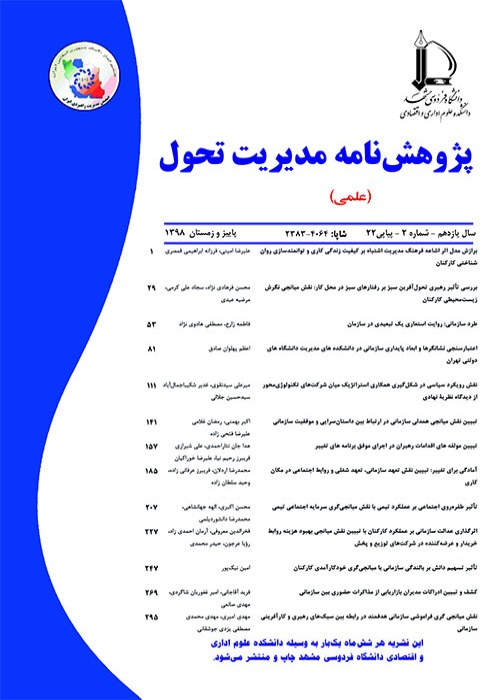Identifying and prioritizing the components of compensation for the customs employees and managers
The compensation is a thing beyond the living needs of employees. compensation affects the characteristics of employees who are hired and stay in the organization, their competency and expertise, the probability of accepting a job by them, and the level of their motivation and performance. compensation is capable of determining the employees’ behavior and the organization’s productivity in all respects. accordingly, with a futuristic approach, the main purpose of the present research is to identify prioritize the components of compensation for employees and managers of the southeast islamic republic of Iran’s customs administration (IRICA).
THEORETICAL FRAMEWORK
The present research has conducted several interviews and analyzed them by the qualitative content analysis technique to determine the affecting factors of compensation for understudy employees and managers. In this regard, it attributed the codes to concepts and then categorized the concepts by adapting the thoughts in Memarzadeh Tehran et al., Nemati et al., Jazani, Towers Perrin, Doaei, Abili and Moafaghi, and Mirsepassi.
This research is an applied study in terms of purpose, and in regard to the procedure, it is a mixed-methods study with an exploratory-consecutive approach. in the qualitative phase, the sample size was 30 which was finalized based on the theoretical saturation rule, and participants were selected by a purposeful sampling method implemented using the snowball technique. since the population size was 1153, in the quantitative phase, 291 persons were selected based on krejcie and morgan’s table by conducting a proportional stratified sampling method. the validity of the qualitative study was assessed by the relative content analysis, and the holsti coefficient used to evaluate its reliability. the validity of the quantitative study was assessed by confirmatory factor analysis, and its reliability also evaluated using cronbach’s alpha and composite reliability coefficients. the qualitative research data were analyzed by content analysis, and for quantitative data analysis, structural equation modeling was used.
Research results revealed 72 factors affecting the staff compensation in the form of two main components (extra- and intra-organizational factors) and 10 sub-components (economic-environmental, social-cultural, direct financial, indirect financial, job non-financial, job environment non-financial, personal, and organizational factors along with organizational vision and upstream documents). No research was found as comprehensive as the current one in exploring the components of compensation in customs administration offices. However, the obtained results are consistent with that of Zafari in regard to direct and indirect financial factors and job environment; with Ozma et al. regards to job non-financial and job environment non-financial factors; with Patnaik and Suar regards to personal and environmental factors; with Memarzadeh Tehran et al. regards to organizational and social factors; with Jazani regards to direct financial, indirect financial, job non-financial, and job environment non-financial factors; with Seyed Javadin regards to direct and indirect factors; with Goh and Gupta regards to personal and organizational factors; with Mphil et al. regards to the direct and indirect compensation.
CONCLUSIONS & SUGGESTIONS
Research results reached a compensation model for customs administration comprised of two components, 10 categories, and 72 factors. it is suggested to both the customs and the government to simultaneously examine the appropriate policies in order to reduce the negative effects of monetary and financial sanctions on government revenues and subsequently on the public organizations’ budget. the customs managers are recommended to interact with clients and provide them with information on problems not necessarily caused by customs. they are also recommended to provide employees with proper feedback to motivate them and improve their performance. if possible, it is better for employees to perform all the stages of a job process on their own instead of doing only an insignificant part of it. Finally, it is suggested to design a mechanism in order to relate employees’ productivity reward with their share of customs revenues and serving the clients. the productivity reward should not be constant and or based on the supervisors' taste.
- حق عضویت دریافتی صرف حمایت از نشریات عضو و نگهداری، تکمیل و توسعه مگیران میشود.
- پرداخت حق اشتراک و دانلود مقالات اجازه بازنشر آن در سایر رسانههای چاپی و دیجیتال را به کاربر نمیدهد.



